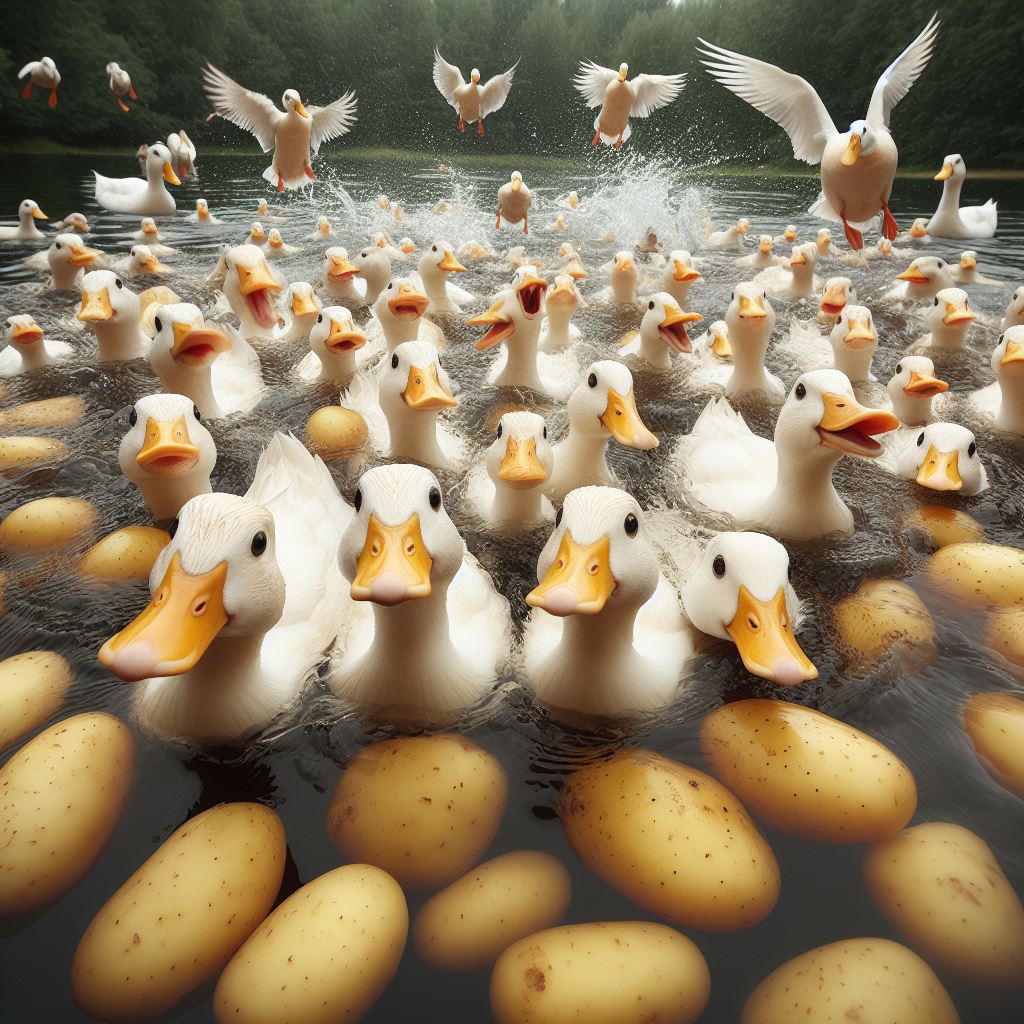Yes, squirrels can eat potatoes, but in moderation.
I always get asked whether these cute critters can eat potatoes.
The short answer is yes, but potatoes should only be an occasional treat, not a regular part of their diet.
Potatoes are packed with carbohydrates and vitamins that provide squirrels with energy and nutrition.
A small amount of cooked potato can be a tasty snack.
However, potatoes do not contain all the nutrients squirrels need to stay healthy.
Their main diet should consist of nuts, seeds, fruits, veggies, and occasional insects or eggs.
Too many potatoes could lead to weight gain or nutritional deficiencies.
Additionally, raw potatoes and skins contain solanine, a toxic compound.
So any potato given to a squirrel must be thoroughly cooked with the skin removed.
Sweet potatoes are lower in solanine, but still should be cooked.
Ultimately, moderation is key when feeding squirrels potatoes.
To learn more about what to feed these bushy-tailed critters, check out my in-depth article below on constructing a balanced squirrel diet.
I provide details on exactly what foods to offer, how much, and how often to promote optimal squirrel health.

- Do squirrels actually eat the potato itself, or just dig it up out of curiosity?
- What types of damage can squirrels cause to potato plants and tubers?
- How can gardeners prevent or deter squirrels from disturbing potato plants?
- Are some types of potatoes more resistant to squirrel digging than others?
- Can leaving some potatoes for squirrels reduce the damage they cause to the main crop?
- What other root vegetables or tubers, besides potatoes, are squirrels known to dig up and potentially eat?
- Helping Resources:
Do squirrels actually eat the potato itself, or just dig it up out of curiosity?
I’ve always been fascinated by the eating habits of squirrels.
When it comes to potatoes, squirrels are known to eat the potato itself, not just dig it up out of curiosity.
Squirrels are omnivores with a diverse diet, and they have been observed consuming a variety of fruits, nuts, seeds, and even vegetables, including potatoes.
Their diet can vary based on what’s available in their environment, but when given the opportunity, they will indeed consume the potato itself.Squirrels are opportunistic feeders and will consume a wide range of foods, including the potato itself.
This behavior is part of their natural foraging and feeding habits, and it’s not just a result of curiosity or exploration.
What types of damage can squirrels cause to potato plants and tubers?
As an agricultural professional with experience in potato production, I can provide some insight into the types of damage squirrels may cause.In brief, squirrels can dig up and eat potato tubers, as well as chew on potato plants’ stems and leaves.
However, extensive or widespread damage from squirrels is uncommon in most areas.Squirrels may dig up freshly planted potato seed pieces or developing tubers.
They seem to prefer the tubers when they are small and tender.
The rodents will eat part of the tuber and leave the rest behind, resulting in rot and waste.
However, most healthy potato plants can tolerate minor tuber loss, and the plant will continue growing additional tubers.At times, squirrels and some other rodents will chew on potato stems and leaves.
This can stunt plants’ growth and potentially reduce yields if damage is extensive.
But limited foliar feeding does not typically cause major crop losses.
Some gardeners report squirrels preferentially targeting potato foliage over other garden plants, but the reason is unclear.
Research shows potato leaves can contain varying levels of toxins like solanine; the concentration depends on the variety and stage of growth.
Perhaps squirrels’ foraging choices are influenced by changing toxicity or nutrients in the plants.
How can gardeners prevent or deter squirrels from disturbing potato plants?
To prevent or deter squirrels from disturbing potato plants, there are several effective methods that gardeners can employ.
One approach is to install a cage or cover using materials such as hardware cloth, plastic bird netting, chicken wire, or row covers to protect the plants or beds.
Additionally, wrapping individual fruits on vegetable plants in small pieces of bird netting can help deter squirrels, as they are often interested in stealing ripe fruits.
Another strategy is to cover bare soil with mulch to discourage squirrels from digging.
Furthermore, inviting natural predators to the garden can also help in deterring squirrels.
These methods can be combined for increased effectiveness in protecting potato plants from squirrel damage.I have found that using a combination of protective covers, such as hardware cloth or bird netting, along with mulching the bare soil, has been effective in preventing squirrels from disturbing my potato plants.
Are some types of potatoes more resistant to squirrel digging than others?
When it comes to protecting potatoes from squirrels, the type of potato itself likely does not make much difference in terms of resistance to squirrel digging.
However, there are some things to consider in choosing potato varieties that may help deter squirrels:
Firstly, earlier maturing potato varieties that are ready for harvest sooner could potentially avoid the most active squirrel digging season in the late summer and fall.
Quickly maturing varieties like early Reds, Yukon Golds or fingerling types may be dug up before squirrels take much interest.
Secondly, potatoes with shallower root systems rather than deep extensive ones might sustain less root damage if squirrels do dig around them.
Varieties described as producing compact plants or tubers close to the soil surface could work well.
Lastly, prolific varieties that produce many small and medium sized tubers could withstand some loss to squirrels yet still produce reasonably well.
Compared to large baking potato types yielding only a few tubers per plant, losing some potatoes here and there to squirrels might hurt less.
In the end though, the most effective squirrel deterrents have little to do with potato variety.
Physical barriers to block access, removal of hiding spots/burrows nearby, soil amendments like sharp gravel, and strong-scented repellents tend to be the best defenses.
The potato type itself is secondary to putting effective squirrel deterrent measures in place.
Can leaving some potatoes for squirrels reduce the damage they cause to the main crop?
I can provide some insight on this question.
Leaving a small portion of the potato crop specifically for squirrels may help reduce the damage they cause to the main harvest.
In short, yes it can be an effective technique if done properly.
By designating an area to intentionally let the squirrels have access to, it can satisfy their need to feed while protecting the crop intended for harvest.
This allows the squirrels to meet their nutritional requirements without completely demolishing the cultivated potatoes.
When implementing this method, it is important to choose an area away from the main crop so that the squirrels concentrate there instead of scattering through the whole field.
The designated “squirrel plot” should be replanted periodically to ensure a continual food supply.
It also helps to till the soil after harvest to uncover any remaining tubers that could attract squirrels back to the main crop area later.
Additionally, the sacrificed plot should be sized appropriately to provide enough food without depleting resources needed for the total potato crop yield.
If the plot is too small, the squirrels may still encroach on the main crop.
In essence, distracting squirrels away from the main harvest can limit losses.
By planning ahead and dedicating a reasonable buffer zone for wildlife, farmers can potentially reduce substantial damage from these persistent pests.
When done thoughtfully, “sharing” part of the crop can lead to higher overall yields.

What other root vegetables or tubers, besides potatoes, are squirrels known to dig up and potentially eat?
Here is a table summarizing some of the other common root vegetables and tubers that squirrels may eat:
| Root Vegetable/Tuber | Details |
|---|---|
| Carrots | Squirrels will dig up and eat both young carrot tops as well as the orange carrot root. |
| Beets | Squirrels will dig up and eat beet roots, beet greens, and young beet seedlings. |
| Radishes | Squirrels will dig up and consume both radish roots and radish greens. |
| Sweet Potatoes | Squirrels will dig up and eat planted sweet potato tubers. |
| Turnips | Squirrels dig up and eat turnip roots, tops, and young turnip seedlings. |
| Parsnips | Squirrels will dig and eat both parsnip tops and roots. |
| Onions | Squirrels may dig up onion bulbs or eat young onion greens. |
Based on the search results, squirrels appear to be willing to dig up and consume a wide variety of root vegetables and tubers that humans also eat.
Their favorites seem to include carrots, beets, radishes, sweet potatoes, turnips, parsnips, and onions.
Helping Resources:
[1] https://garden.org/thread/view/32832/Squirrels-stealing-potatoes/
[2] https://thefurbearers.com/blog/how-i-stopped-squirrels-from-stealing-spuds/
[3] https://www.farmersalmanac.com/keep-squirrels-out-garden
[4] https://www.gardenerbasics.com/blog/keep-squirrels-from-digging-up-plants
[5] https://www.houzz.com/discussions/3863041/protecting-my-pots-from-squirrels-in-the-early-spring